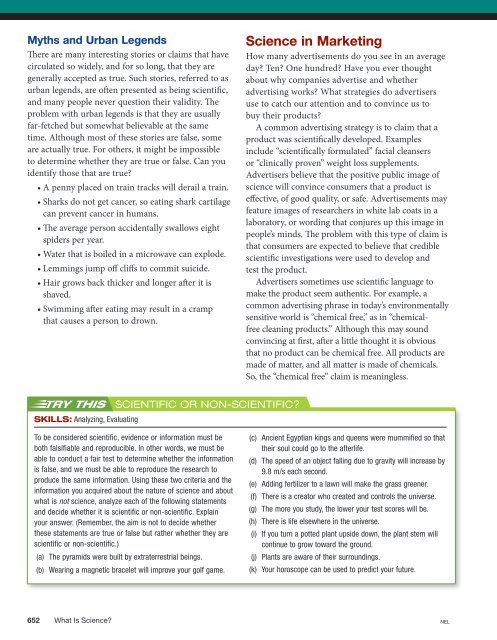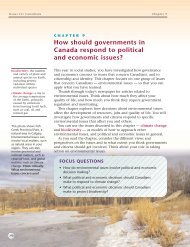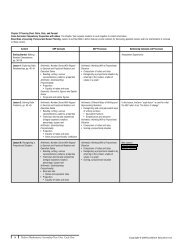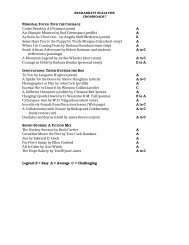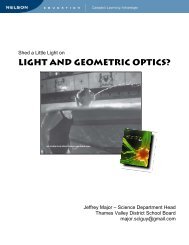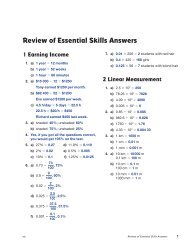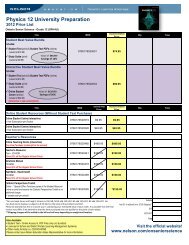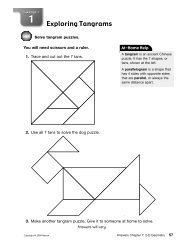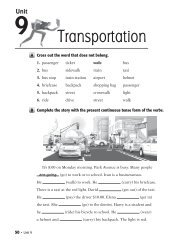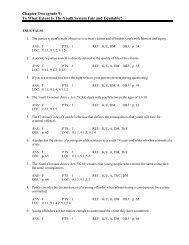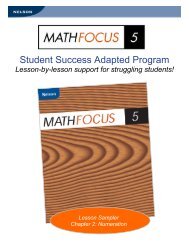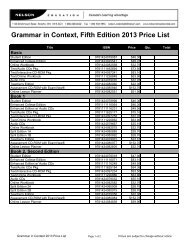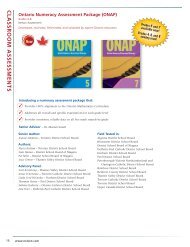PRE-PUBLICA TION EDITION - Nelson Education
PRE-PUBLICA TION EDITION - Nelson Education
PRE-PUBLICA TION EDITION - Nelson Education
You also want an ePaper? Increase the reach of your titles
YUMPU automatically turns print PDFs into web optimized ePapers that Google loves.
Myths and Urban LegendsThere are many interesting stories or claims that havecirculated so widely, and for so long, that they aregenerally accepted as true. Such stories, referred to asurban legends, are often presented as being scientific,and many people never question their validity. Theproblem with urban legends is that they are usuallyfar-fetched but somewhat believable at the sametime. Although most of these stories are false, someare actually true. For others, it might be impossibleto determine whether they are true or false. Can youidentify those that are true?• A penny placed on train tracks will derail a train.• Sharks do not get cancer, so eating shark cartilagecan prevent cancer in humans.• The average person accidentally swallows eightspiders per year.• Water that is boiled in a microwave can explode.• Lemmings jump off cliffs to commit suicide.• Hair grows back thicker and longer after it isshaved.• Swimming after eating may result in a crampthat causes a person to drown.Science in MarketingHow many advertisements do you see in an averageday? Ten? One hundred? Have you ever thoughtabout why companies advertise and whetheradvertising works? What strategies do advertisersuse to catch our attention and to convince us tobuy their products?A common advertising strategy is to claim that aproduct was scientifically developed. Examplesinclude “scientifically formulated” facial cleansersor “clinically proven” weight loss supplements.Advertisers believe that the positive public image ofscience will convince consumers that a product iseffective, of good quality, or safe. Advertisements mayfeature images of researchers in white lab coats in alaboratory, or wording that conjures up this image inpeople’s minds. The problem with this type of claim isthat consumers are expected to believe that crediblescientific investigations were used to develop andtest the product.Advertisers sometimes use scientific language tomake the product seem authentic. For example, acommon advertising phrase in today’s environmentallysensitive world is “chemical free,” as in “chemicalfreecleaning products.” Although this may soundconvincing at first, after a little thought it is obviousthat no product can be chemical free. All products aremade of matter, and all matter is made of chemicals.So, the “chemical free” claim is meaningless.TRy ThisSkills:Analyzing, EvaluatingSCIENTIFIC OR NON-SCIENTIFIC?To be considered scientific, evidence or information must beboth falsifiable and reproducible. In other words, we must beable to conduct a fair test to determine whether the informationis false, and we must be able to reproduce the research toproduce the same information. Using these two criteria and theinformation you acquired about the nature of science and aboutwhat is not science, analyze each of the following statementsand decide whether it is scientific or non-scientific. Explainyour answer. (Remember, the aim is not to decide whetherthese statements are true or false but rather whether they arescientific or non-scientific.)(a) The pyramids were built by extraterrestrial beings.(b) Wearing a magnetic bracelet will improve your golf game.(c) Ancient Egyptian kings and queens were mummified so thattheir soul could go to the afterlife.(d) The speed of an object falling due to gravity will increase by9.8 m/s each second.(e) Adding fertilizer to a lawn will make the grass greener.(f) There is a creator who created and controls the universe.(g) The more you study, the lower your test scores will be.(h) There is life elsewhere in the universe.(i) If you turn a potted plant upside down, the plant stem willcontinue to grow toward the ground.(j) Plants are aware of their surroundings.(k) Your horoscope can be used to predict your future.652 What Is Science?NEL


